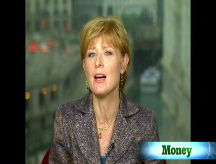Why you can't trust your gut in this market
Look closely. Do you see the onset of another Great Depression? Maybe it's all in your mind.
(Money Magazine) -- If you think you're immune to market panic, consider this experiment.
Recently, Jennifer A. Whitson of the University of Texas at Austin and Adam D. Galinsky at Northwestern University asked a group of people to recall situations when they felt out of control. Then they asked those people to find patterns in a series of blurry pictures. People in a control group were asked to find patterns in the same images but weren't told to recall stressful situations first.
Turns out, the people who had imagined the stressful events said they could identify more patterns in the pictures than did the control group. The pictures, by the way, were completely random. The patterns didn't exist.
The academics weren't finished. They showed one group a headline that read "Rough Seas Ahead for Investors" and showed another group the headline "Smooth Sailing Ahead for Investors." The two groups then received some fragmentary information about a couple of companies. You guessed it: The group that was worried about "rough seas" spun out more unwarranted theories about what was going on with the companies than the other group did.
These studies reconfirm what psychologists have been saying for years now: The more we feel out of control, the more our brains imagine patterns that don't really exist.
Doing that, the theory goes, helps us manage our stress. Maybe we haven't come so far from the rain dances common in agricultural societies. It's precisely because they don't control the drops falling from the sky that many people construct elaborate rituals to pretend that they do.
It makes sense, then, that conspiracy theories become more popular in bad or stressful times. Many people want to think that at least someone is in control even if that isn't the case.
Of course, some patterns really are there. For instance, volatile markets tend to remain volatile for months on end. That's why we saw many big daily shifts in the Dow in the fall of 2008, not just one or two. But if you want to make the smartest money moves in tough times - and who doesn't? - you would do well to factor in the reality that you probably aren't assessing things as well right now as you usually do.
Practically speaking, you need to ignore the temptation to make investment bets based on the theory that a depression has to happen every so many years, that our economy is just like Japan's was in the 1990s or that Wall Street is conspiring against Main Street.
Instead, work to counteract the harmful effect of stress on your perceptions. Studies show that if people contemplate and reaffirm their most important values, such as honesty and compassion, they go on to make better and more rational decisions. That's because those thoughts help you feel more in control, which frees up your mind to focus on and think through the question at hand.
So if you can't stop reading about the similarities between now and the Great Depression, thinking about the support you get from your family may prevent you from panic-selling precisely when you would later regret it most.
Pause, appreciate, then act. That's one pattern whose benefits are no illusion.
Tyler Cowen is a professor of economics at George Mason University. Send your comments to money_letters@moneymail.com.
Have you lost 40% or more of your net worth in the market? We may be able to help. Tell us how much you lost, what you have left, and what you're invested in, at makeover@moneymail.com. Include name, age, city, state and a recent photo. ![]()



